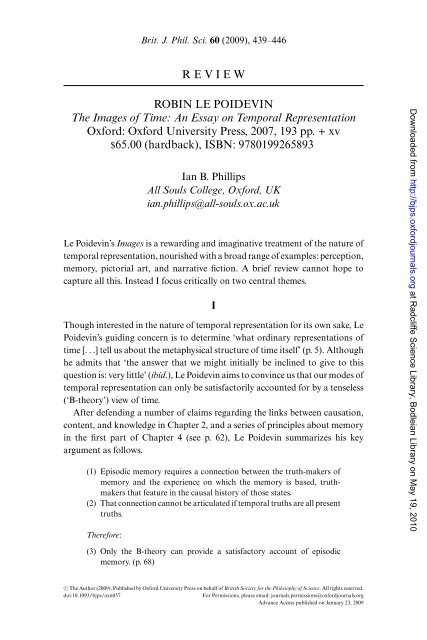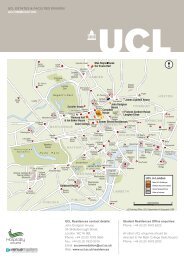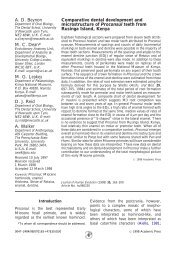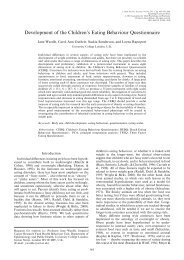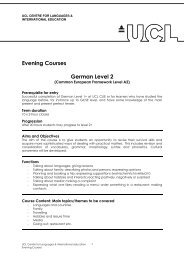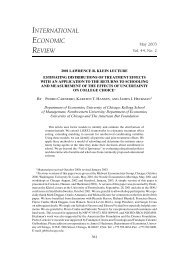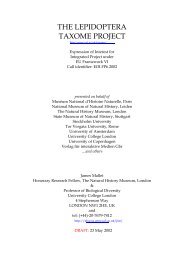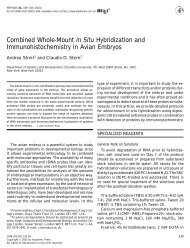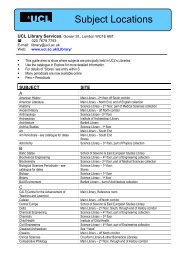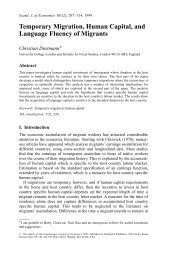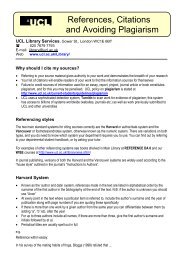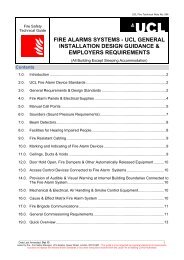REVIEW ROBIN LE POIDEVIN The Images of Time: An Essay ... - UCL
REVIEW ROBIN LE POIDEVIN The Images of Time: An Essay ... - UCL
REVIEW ROBIN LE POIDEVIN The Images of Time: An Essay ... - UCL
You also want an ePaper? Increase the reach of your titles
YUMPU automatically turns print PDFs into web optimized ePapers that Google loves.
Brit. J. Phil. Sci. 60 (2009), 439–446<br />
<strong>REVIEW</strong><br />
<strong>ROBIN</strong> <strong>LE</strong> <strong>POIDEVIN</strong><br />
<strong>The</strong> <strong>Images</strong> <strong>of</strong> <strong>Time</strong>: <strong>An</strong> <strong>Essay</strong> on Temporal Representation<br />
Oxford: Oxford University Press, 2007, 193 pp. + xv<br />
$65.00 (hardback), ISBN: 9780199265893<br />
Ian B. Phillips<br />
All Souls College, Oxford, UK<br />
ian.phillips@all-souls.ox.ac.uk<br />
Le Poidevin’s <strong>Images</strong> is a rewarding and imaginative treatment <strong>of</strong> the nature <strong>of</strong><br />
temporal representation, nourished with a broad range <strong>of</strong> examples: perception,<br />
memory, pictorial art, and narrative fiction. A brief review cannot hope to<br />
capture all this. Instead I focus critically on two central themes.<br />
I<br />
Though interested in the nature <strong>of</strong> temporal representation for its own sake, Le<br />
Poidevin’s guiding concern is to determine ‘what ordinary representations <strong>of</strong><br />
time [...] tell us about the metaphysical structure <strong>of</strong> time itself’ (p. 5). Although<br />
he admits that ‘the answer that we might initially be inclined to give to this<br />
question is: very little’ (ibid.), Le Poidevin aims to convince us that our modes <strong>of</strong><br />
temporal representation can only be satisfactorily accounted for by a tenseless<br />
(‘B-theory’) view <strong>of</strong> time.<br />
After defending a number <strong>of</strong> claims regarding the links between causation,<br />
content, and knowledge in Chapter 2, and a series <strong>of</strong> principles about memory<br />
in the first part <strong>of</strong> Chapter 4 (see p. 62), Le Poidevin summarizes his key<br />
argument as follows.<br />
(1) Episodic memory requires a connection between the truth-makers <strong>of</strong><br />
memory and the experience on which the memory is based, truthmakers<br />
that feature in the causal history <strong>of</strong> those states.<br />
(2) That connection cannot be articulated if temporal truths are all present<br />
truths.<br />
<strong>The</strong>refore:<br />
Downloaded from http://bjps.oxfordjournals.org at Radcliffe Science Library, Bodleian Library on May 19, 2010<br />
(3) Only the B-theory can provide a satisfactory account <strong>of</strong> episodic<br />
memory. (p. 68)<br />
C○ <strong>The</strong> Author (2009). Published by Oxford University Press on behalf <strong>of</strong> British Society for the Philosophy <strong>of</strong> Science. All rights reserved.<br />
doi:10.1093/bjps/axn057<br />
For Permissions, please email: journals.permissions@oxfordjournals.org<br />
Advance Access published on January 23, 2009
440 Review<br />
Imagine, for example, that on Monday Bernard feels blue. According to Le<br />
Poidevin, Bernard’s belief on Monday that he feels blue is made true by the<br />
then fact that he feels blue. On Friday, Bernard recalls that he felt blue on<br />
Monday. 1 How does the A-theorist account for the truth <strong>of</strong> this memory? It<br />
seems, argues Le Poidevin, that the A-theorist cannot appeal to the original<br />
fact since that is no longer part <strong>of</strong> reality; it has been replaced by the fact<br />
that Bernard felt blue. Thus, the original truth-maker cannot make his present<br />
memory true. Le Poidevin holds that this is problematic because we now seem<br />
to lack an explanation as to why his memory can only be true if his earlier belief<br />
on Monday was true.<br />
If the original belief and later memory have different (indeed, incompatible)<br />
truth-makers, why should the truth <strong>of</strong> the memory depend in any way upon<br />
the truth <strong>of</strong> the original belief ? (p. 66)<br />
Two broad strategies <strong>of</strong> A-theoretic response to this argument are considered,<br />
one concessive, one not.<br />
<strong>The</strong> concessive strategy replies that Bernard’s present memory that he felt<br />
blue can only be true if it was the case that Bernard feels blue; one preserves<br />
knowledge over time by continually standing in relation to some fact that is<br />
appropriately related to (though not identical with) the fact that was originally<br />
known. 2 Reconstructing, one can understand Le Poidevin as pressing two<br />
challenges here. First, if the original fact really has ‘gone out <strong>of</strong> existence’ (p. 66)<br />
and, moreover, relations entail the existence <strong>of</strong> their relata, it is hard to see how<br />
any such ‘appropriate relation’ could obtain. Second, since the truth-makers<br />
<strong>of</strong> both antecedent and consequent (in the first sentence <strong>of</strong> this paragraph)<br />
are present facts, no explanation has been <strong>of</strong>fered <strong>of</strong> the connection between<br />
the memory’s truth and the original belief’s, unless the notion <strong>of</strong> ‘appropriate<br />
relation’ is spelt out. To the first challenge, the reply might be made that<br />
being an A-theorist need not include being a presentist. However, Le Poidevin<br />
seems entirely justified in pressing his second concern, something that might<br />
encourage the A-theorist to take a less concessive approach.<br />
<strong>The</strong> non-concessive strategy denies that there is any need to engage in the<br />
project <strong>of</strong> finding ‘appropriate relations’. According to the non-concessive theorist,<br />
the constitution <strong>of</strong> reality is irreducibly perspectival. 3 Thus, from Friday’s<br />
1<br />
Strictly, this is a semantic memory and so, strictly, the argument is concerned with the ‘truthmakers’<br />
<strong>of</strong> our beliefs about past, experienced events, i.e., the truth-makers <strong>of</strong> a certain class <strong>of</strong><br />
semantic memories as opposed to being about episodic memory per se.<br />
2<br />
cf. Brogaard ([unpublished], Chapter 1, p. 52) who, in replying to Richard’s ([1981]) attack on<br />
temporalism, the view that propositions can change their truth-value over time, insists that ‘one<br />
can ...retain a belief ...by maintaining a belief relation to an object that is appropriately related<br />
to the original object, namely the object <strong>of</strong> the original belief occurring within the scope <strong>of</strong> some<br />
past tense operator or other.’<br />
3<br />
For a sophisticated framework for thinking about these issues, see (Fine [2005]).<br />
Downloaded from http://bjps.oxfordjournals.org at Radcliffe Science Library, Bodleian Library on May 19, 2010
<strong>The</strong> British Journal for the Philosophy <strong>of</strong> Science 441<br />
perspective, the truth-maker <strong>of</strong> Bernard’s belief on Monday just is the fact that<br />
Bernard then felt blue. Bernard’s memory <strong>of</strong> feeling blue has this very same<br />
fact as truth-maker. <strong>The</strong>re is no gap between ‘incompatible’ truth-makers to<br />
bridge. Le Poidevin will object that Bernard’s belief on Monday that he feels<br />
blue is made true by the then fact that he feels blue, and thus that no causal<br />
connection has been secured between this original truth maker <strong>of</strong> the belief as<br />
was on Monday, and Bernard’s memory on Friday, flouting premise (1). But<br />
this objection fails to take seriously enough the key non-concessive claim that<br />
the constitution <strong>of</strong> reality is irreducibly relative. In talking <strong>of</strong> facts as were on<br />
Monday, one is talking about a different reality. Confining oneself to any one<br />
reality, there is no flouting <strong>of</strong> the kinds <strong>of</strong> causal principles Le Poidevin wishes<br />
to insist on. From Friday’s point <strong>of</strong> view, the original truth maker <strong>of</strong> Bernard’s<br />
belief on Monday is thefactthatBernardfelt blue on Monday.<br />
II<br />
<strong>The</strong> idea that perceptual experience tells in favour <strong>of</strong> a certain metaphysical<br />
conception <strong>of</strong> time is stock-in-trade for the A-theorist, who standardly appeals<br />
to our experience as evidence for her view. Le Poidevin’s discussion in Chapter 5<br />
sets out to defuse this line <strong>of</strong> thought, first by helpfully distinguishing a variety<br />
<strong>of</strong> aspects <strong>of</strong> experience that the A-theorist might appeal to, then by showing<br />
how each can be accounted for by the B-theorist. Le Poidevin’s scepticism<br />
regarding such appeals by the A-theorist is well founded. But B-theorist beware;<br />
endorsing this negative aspect <strong>of</strong> Le Poidevin’s discussion need not commit one<br />
to his more controversial positive proposals.<br />
First, take the A-theoretic appeal to the idea that we experience events as<br />
present. Le Poidevin replies that there is no interesting distinction between<br />
perceiving an event as present and simply perceiving it. Thus, the A-theorist<br />
‘has not identified any particular aspect <strong>of</strong> perception that requires explanation’<br />
(p. 78). If this is right, something needs saying to explain our inclination to<br />
regard star-gazing as involving temporal illusion. Le Poidevin suggests that<br />
perception at most deludes us because <strong>of</strong> the ‘logically contingent’ feature <strong>of</strong><br />
perceptual experience that it is ‘accompanied by present-tense beliefs’ (ibid.).<br />
Someone who, pace Le Poidevin, is inclined to think that experience itself<br />
intrinsically warrants our present-tense beliefs will want to know what it is<br />
about the intrinsic nature <strong>of</strong> our experience itself that grounds specifically<br />
present-tense beliefs. 4 A more conciliatory B-theoretic approach would be to<br />
question whether there was anything more to perceiving an event as present<br />
than perceiving it as occurring simultaneously with one’s experience <strong>of</strong> it. 5<br />
Downloaded from http://bjps.oxfordjournals.org at Radcliffe Science Library, Bodleian Library on May 19, 2010<br />
4<br />
Compare and contrast the dialectic in (Armstrong [1961], p. 144f.).<br />
5<br />
I do not mean to suggest that this strategy is ultimately successful.
442 Review<br />
Second, take the A-theoretic appeal to our experience <strong>of</strong> temporal properties<br />
(e.g., succession) and properties logically connected to time (e.g., motion).<br />
Le Poidevin begins by formulating ‘a phenomenological paradox’ (p. 87f.),<br />
which we can state as follows.<br />
(i) Everything we experience, we experience as present. 6<br />
(ii) We experience succession, e.g., one note succeeding another.<br />
(iii) Yet, by definition, notes heard as successive cannot also both be heard<br />
as present.<br />
<strong>The</strong>re is only a difficulty here if we endorse a further assumption, viz., that<br />
succession (or motion), if experienced at all, must be wholly experienced at<br />
some one moment (cf. p. 92). 7 Without that assumption, nothing blocks the<br />
view that our experience <strong>of</strong> succession involves successively experiencing sounds<br />
as present. At any moment we may be experiencing succession, but that fact<br />
holds only in virtue <strong>of</strong> our experience <strong>of</strong> succession over some longer interval.<br />
Our experience <strong>of</strong> unfolding events itself essentially unfolds over time.<br />
Le Poidevin explicitly rejects the necessary assumption, when he endorses<br />
Dainton’s view that it is ‘deeply implausible’ that our experience <strong>of</strong> time can<br />
be analysed in terms <strong>of</strong> experience at particular instants (p. 79). However,<br />
he does not see that this defuses the paradox. Thus, he feels driven into the<br />
murky waters <strong>of</strong> the traditional debate concerning the perception <strong>of</strong> temporal<br />
properties, which exists precisely because <strong>of</strong> an acceptance <strong>of</strong> the additional<br />
assumption just flagged.<br />
One way <strong>of</strong> conceiving the traditional debate is in terms <strong>of</strong> two rival camps:<br />
specious present theorists and memory theorists. 8 Roughly, specious present<br />
theorists (e.g., Russell [1921]; Broad [1923]) hold that at any instant we are<br />
literally aware <strong>of</strong> extended periods <strong>of</strong> time; memory theorists (e.g., Reid [1827];<br />
Husserl [1991]) deny this and hold that the perception <strong>of</strong> temporal properties<br />
is the joint upshot <strong>of</strong> our perception <strong>of</strong> the present instant, combined with very<br />
recent memory. In these terms, Le Poidevin endorses Kelly’s recent attack on<br />
the specious present theory (Kelly [2005]) before adopting a traditional form <strong>of</strong><br />
memory theory on which, ‘What gives rise to the experience <strong>of</strong> pure succession<br />
[in a case where a C and an E are heard successively] ...is the conjunction <strong>of</strong><br />
the perception <strong>of</strong> E with the very recent memory <strong>of</strong> C’ (p. 92).<br />
6<br />
Curiously, given what has just been discussed, Le Poidevin does not discuss giving up this<br />
premise. Nonetheless, the ‘paradox’ is not resolved by adopting the token-reflexive approach just<br />
suggested.<br />
7<br />
We also need the questionable, though traditional, assumption (one that Le Poidevin endorses)<br />
that the present is instantaneous.<br />
8<br />
For this reviewer’s own conception and critique <strong>of</strong> the debate, see (Phillips [forthcoming]). Dainton<br />
([2000]) <strong>of</strong>fers an excellent introduction.<br />
Downloaded from http://bjps.oxfordjournals.org at Radcliffe Science Library, Bodleian Library on May 19, 2010
<strong>The</strong> British Journal for the Philosophy <strong>of</strong> Science 443<br />
This view not only provides us with an escape from paradox but also, according<br />
to Le Poidevin, is quite acceptable to the B-theorist. 9 Again: caveat emptor!<br />
This kind <strong>of</strong> theory faces notorious difficulties. In particular, it is extremely<br />
hard to see how it could apply to our experience <strong>of</strong> individual sounds. 10 <strong>The</strong><br />
obvious suggestion is that hearing a sound can be analysed as the hearing <strong>of</strong> a<br />
present ‘tone-phase’ conjoined with a memory <strong>of</strong> recent tone-phases. However,<br />
it seems impossible to conceive <strong>of</strong> a sound or sound-phase that does not have<br />
some duration. Given this, the proposed analysis simply takes for granted our<br />
perception <strong>of</strong> a present, yet temporally extended sound—just the kind <strong>of</strong> claim<br />
that supposedly engenders paradox and leads Le Poidevin, following Kelly, to<br />
regard the specious present theory as ‘unintelligible’ (p. 81). Both A- and B-<br />
theorists should eschew this approach. Instead they should agree with Dainton<br />
that experience cannot be analysed down to instants and deny that there is any<br />
paradox here.<br />
In the final section <strong>of</strong> the chapter, Le Poidevin proposes the following, far<br />
more radical claim.<br />
<strong>The</strong> datum <strong>of</strong> experience, that we experience motion, is ...no mere passive<br />
reception <strong>of</strong> an objective phenomenon, but one that arises, in part, from the<br />
active interpretation <strong>of</strong> the mind. It is, at least in some cases, a projection.<br />
(p. 93)<br />
Where might motivation lie for this heady stuff ? After all, one might well have<br />
thought that Le Poidevin’s memory-theory <strong>of</strong> succession had already accounted<br />
for our experience <strong>of</strong> motion.<br />
Le Poidevin suggests that neuropsychology evinces projectivism. To update<br />
his sketch <strong>of</strong> the neuropsychology slightly, motion perception is subserved by<br />
a reference signal (see Wertheim [1994], [1999]), which serves an evaluative<br />
function in relation to data drawn exclusively from the retinal images. <strong>The</strong><br />
reference signal combines (a) an ‘efference copy signal,’ providing information<br />
about oculomotor commands, used to determine eye velocity in relation to<br />
the head, (b) a ‘vestibular afferent signal,’ providing information related to the<br />
location and movement <strong>of</strong> the head in space, and (c) a ‘visual afferent signal,’<br />
carrying information directly extracted from retinal image flows. Together, these<br />
inputs are used to distinguish eye-movement from object-movement.<br />
Do these facts motivate the idea that perception involves the ‘active projection<br />
<strong>of</strong> states or events on to the world’? Not obviously. <strong>An</strong> alternative way to<br />
think about the neural structures noted above is as subserving perceptual consciousness,<br />
by making accessible to us (i.e., manifest in perceptual experience)<br />
Downloaded from http://bjps.oxfordjournals.org at Radcliffe Science Library, Bodleian Library on May 19, 2010<br />
9<br />
Indeed, if the argument discussed in Section I were successful, only available to the B-theorist.<br />
10 A point elegantly brought out by Prichard ([1950]).
444 Review<br />
various features <strong>of</strong> the mind-independent empirical world. 11 In particular,<br />
the processing which combines the ‘reference signal’ with a purely retinal<br />
data-stream helps make accessible the motion properties <strong>of</strong> objects around us<br />
by ‘factoring out’ self-motion. On this view, to think <strong>of</strong> this neural activity as the<br />
‘active interpretation <strong>of</strong> the mind,’ would be to make a subpersonal-/personallevel<br />
confusion. Certainly, things go awry and illusions occur (notoriously in<br />
lifts and trains). But why think illusory motion involves projection any more<br />
than illusory shape or size? 12<br />
III<br />
At the end <strong>of</strong> <strong>Images</strong>, Le Poidevin expresses the hope that his study ‘indicates<br />
the possibility <strong>of</strong> a rapprochement—or perhaps approchement would be a better<br />
word—between two different traditions: on the one hand, the analytic philosophy<br />
<strong>of</strong> time, which has long been dominated by the philosophy <strong>of</strong> spacetime<br />
physics and the semantics <strong>of</strong> tense, and on the other, the phenomenological<br />
approach associated with writers such as Bergson and Husserl, which on<br />
the whole has been sceptical <strong>of</strong> metaphysical inquiry. ...Phenomenology and<br />
metaphysics need not be strangers’ (pp. 178–9).<br />
As Le Poidevin acknowledges, neither Bergson nor Husserl plays any significant<br />
role in <strong>Images</strong>. But we do not need to cross the channel to find phenomenological<br />
approaches to the philosophy <strong>of</strong> time. Discussion <strong>of</strong> time-consciousness<br />
within and without the <strong>An</strong>glophone tradition in the heyday <strong>of</strong> the late nineteenth<br />
and early twentieth century was remarkably unified in its concern to<br />
explain the nature <strong>of</strong> our temporal experience. 13 This phenomenological focus<br />
was inseparable from metaphysical theorising—witness the opposing views <strong>of</strong><br />
Russell and Bergson. 14 Nor was it separated from physics, or science more<br />
generally. Indeed, a major (if not the major) argument for sense-data was the<br />
time-lag argument. 15 <strong>An</strong>d other scientific arguments were <strong>of</strong>ten adduced by<br />
philosophers in arguing for their preferred view <strong>of</strong> perceptual experience. One<br />
very obvious example being Broad’s Scientific Thought, which a contemporary<br />
reviewer declares ‘to bring the philosophy based on experience abreast <strong>of</strong><br />
current scientific achievement’ (Brown [1923], p. 691), by which is primarily<br />
11 cf. (Campbell [2002], pp. 118–20) and (Brewer [2004], pp. 69–70).<br />
12 Le Poidevin also mentions the ‘flash-lag’ illusion. Here I think there is a genuine and important<br />
challenge to our naïve picture <strong>of</strong> temporal perception, a challenge pressed most forcefully by<br />
Dennett and Kinsbourne ([1992]). But that is a matter for another time; Le Poidevin does not<br />
dwell on those concerns.<br />
13 For an excellent introductory survey, see (<strong>An</strong>dersen and Grush [2009]), especially their remarks<br />
on Husserl and Hodgson.<br />
14 See especially (Russell [1914]).<br />
15 <strong>An</strong>glophone discussions include (Russell [1912], pp. 16–7, [1948], p. 204) and (Broad [1923],<br />
pp. 376–86) though there are phenomenological discussions too; for example, (Husserl [1991],<br />
p. 114, Appendix V). Leibniz <strong>of</strong>fers an early statement <strong>of</strong> the argument ([1981], pp. ix, 8).<br />
Downloaded from http://bjps.oxfordjournals.org at Radcliffe Science Library, Bodleian Library on May 19, 2010
<strong>The</strong> British Journal for the Philosophy <strong>of</strong> Science 445<br />
meant spacetime physics. 16 Certainly, Husserl declines this approach when he<br />
introduces the technical notion <strong>of</strong> the phenomenological reduction, but even<br />
so his principal concerns (and indeed theories) are shared with <strong>An</strong>glophone<br />
writers <strong>of</strong> the time.<br />
This all suggests that issues to do with the metaphysics <strong>of</strong> time and<br />
the problems <strong>of</strong> time-consciousness have not been strangers because <strong>of</strong> a divergence<br />
<strong>of</strong> analytic and phenomenological traditions. Indeed, it seems more<br />
plausible to locate the gulf within the modern analytic tradition itself, which in<br />
the second half <strong>of</strong> the last century has allowed metaphysics and philosophy <strong>of</strong><br />
perception (and indeed aesthetics) to drift apart in a way that would have deeply<br />
puzzled our forebears. 17 In this light, <strong>Images</strong> is a most welcome champion <strong>of</strong><br />
rapprochement. 18<br />
References<br />
<strong>An</strong>dersen, H. and Grush, R. [2009]: ‘A Brief History <strong>of</strong> <strong>Time</strong>-Consciousness: Historical<br />
Precursors to James and Husserl’, Journal <strong>of</strong> the History <strong>of</strong> Philosophy, 47, pp. 277–<br />
307.<br />
Armstrong, D. M. [1961]: Perception and the Physical World, New York: Humanities<br />
Press.<br />
Bergson, H. [1914]: Creative Evolution, translated by A. Mitchell, London: Macmillan.<br />
Brewer, B. [2004]: ‘Realism and the Nature <strong>of</strong> Perceptual Experience’, Philosophical<br />
Issues, 14, pp. 61–77.<br />
Broad, C. D. [1923]: Scientific Thought, London: Routledge & Kegan Paul.<br />
Brogaard, B. [unpublished]: Transient Truths: <strong>An</strong> <strong>Essay</strong> in the Metaphysics <strong>of</strong> Propositions,<br />
available online at <br />
Brown, H. C. [1923]: Review <strong>of</strong> (Broad [1923]), Journal <strong>of</strong> Philosophy, 20, pp. 689–92.<br />
Campbell, J. [2002]: Reference and Consciousness, Oxford: Oxford University Press.<br />
Dainton, B. [2000]: Stream <strong>of</strong> Consciousness, London: Routledge & Kegan Paul.<br />
Dennett, D. C. and Kinsbourne, M. [1992]: ‘<strong>Time</strong> and the Observer: <strong>The</strong> Where and<br />
When <strong>of</strong> Consciousness in the Brain’, Behavioral and Brain Sciences, 15, pp. 183–200.<br />
Fine, K. [2005]: ‘Tense and Reality’, in his Modality and Tense: Philosophical Papers,<br />
Oxford: Oxford University Press, pp. 261–320.<br />
Husserl, E. [1991]: On the Phenomenology <strong>of</strong> the Consciousness <strong>of</strong> Internal <strong>Time</strong> (1893–<br />
1917), translated by J. B. Brough, Dordrecht: Kluwer.<br />
Kelly, S. [2005]: ‘<strong>The</strong> Puzzle <strong>of</strong> Temporal Experience’, in A. Brook and K. Akins (eds),<br />
Cognition and the Brain, Cambridge, UK: Cambridge University Press, pp. 208–38.<br />
Phillips, I. B. [forthcoming]: ‘Perceiving Temporal Properties’, European Journal <strong>of</strong> Philosophy,<br />
doi: 10.1111/j.1468-0378.2008.00299.x<br />
Downloaded from http://bjps.oxfordjournals.org at Radcliffe Science Library, Bodleian Library on May 19, 2010<br />
16 But see also (Bergson [1914]) for an approach steeped in contemporary science.<br />
17 One obvious explanation is sense-datum fatigue.<br />
18 Thanks to Matt Soteriou and Lee Walters for very helpful comments.
446 Review<br />
Prichard, H. A. [1950]: ‘<strong>The</strong> Apprehension <strong>of</strong> <strong>Time</strong>’, in H. A. Prichard (ed.), Knowledge<br />
and Perception, Oxford: Clarendon Press, pp. 47–51.<br />
Reid, T. [1827]: <strong>Essay</strong>s on the Powers <strong>of</strong> the Human Mind; to Which Are Added, an <strong>Essay</strong><br />
on Quantity, and an <strong>An</strong>alysis <strong>of</strong> Aristotle’s Logic, London: Thomas Tegg.<br />
Richard, M. [1981]: ‘Temporalism and Eternalism’, Philosophical Studies, 39, pp. 1–13.<br />
Russell, B. [1912]: <strong>The</strong>Problems<strong>of</strong>Philosophy, Oxford: Oxford University Press.<br />
Russell, B. [1914]: <strong>The</strong> Philosophy <strong>of</strong> Bergson, London: Macmillan.<br />
Russell, B. [1921]: <strong>The</strong> <strong>An</strong>alysis <strong>of</strong> Mind, London: G. Allen and Unwin.<br />
Russell, B. [1948]: Human Knowledge: Its Scope and Limits, London: Allen and Unwin.<br />
Wertheim, A. H. [1994]: ‘Motion Perception during Self-Motion: <strong>The</strong> Direct versus<br />
Inferential Controversy Revisited’, Behavioral and Brain Sciences, 17, pp. 293–355.<br />
Wertheim, A. H. [1999]: ‘Motion Percepts: “Sense Specific,” “Kinematic,” or ...?’, Behavioral<br />
and Brain Sciences, 22, pp. 338–40.<br />
Downloaded from http://bjps.oxfordjournals.org at Radcliffe Science Library, Bodleian Library on May 19, 2010


